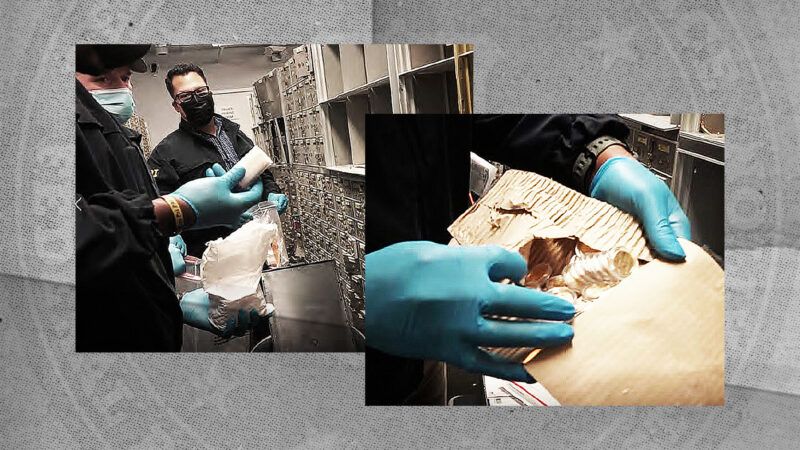FBI Seized $86 Million From People Not Suspected of Any Crime. A Federal Court Will Decide if That's Legal.
On Thursday, a federal appeals court will hear about the FBI's "blatant scheme to circumvent" the Fourth Amendment.

Following a raid in March 2021, federal agents spent days rifling through the personal belongings stored in nearly 1,400 safe deposit boxes seized from a vault in Beverly Hills, California.
The agents were tasked with cataloging the contents of the boxes, but they also seized piles of valuables—gold coins, luxury watches, family heirlooms, and stacks of cash—from people who had not been charged with any crimes.
And they did that despite being told, by the warrant authorizing the raid, that the contents of the safe deposit boxes were off-limits.
On Thursday, a panel of federal judges at the Ninth Circuit Court of Appeals will be asked whether the FBI's brazen smash-and-grab scheme that netted more than $86 million in forfeited cash and property violated the Fourth Amendment rights of the raid's innocent victims.
"The fundamental principle at stake is that if the government wants to search and seize your property, it has to have some reason to think you did something wrong," Rob Johnson, an attorney with the Institute for Justice (IJ) and one of the lawyers who will argue the case before the circuit court on Thursday, wrote this week on Twitter. "The FBI came up with a blatant scheme to circumvent that fundamental principle, and, so far, no court has held them to account."
When the case went before a lower court last year, federal Judge Gary Klausner ruled that the FBI's inventory of the seized safe deposit boxes was legal, despite acknowledging that attorneys for the plaintiffs "have certainly shown that the government had a dual motive in inventorying the contents of each deposit box."
There's ample evidence showing that the FBI's "dual motive" was part of the scheme from the beginning. As Reason has previously detailed, the warrant for the raid explicitly forbade law enforcement from seizing or searching the private property contained in the safe deposit boxes held at U.S. Private Vaults, which was the target of the FBI's investigation. During depositions, FBI agents admitted that they planned to forfeit cash and other valuables from the boxes, even though they did not include those plans in the warrant application.
The U.S. attorney's office tried to block the disclosure of those depositions and other court documents that "laid bare the government's deception," the Los Angeles Times reported last year.
In the affidavit requesting a warrant to go after U.S. Private Vaults—whose owners were charged with several federal crimes after the raid—Assistant U.S. Attorney Andrew Brown wrote that federal agents intended to merely inventory the contents of the seized safe deposit boxes. But court documents later showed that the FBI had drawn up plans months earlier to forfeit property from the boxes and failed to inform the magistrate judge about those plans. (Disclosure: Reason submitted an amicus brief in the case arguing that the redacted documents should be made public.)
Some forfeited property has been returned to the innocent victims of the raid, but only after they submitted to an FBI investigation or launched legal challenges seeking to recover what was taken. Many others have been unable to reclaim what they own. The class action lawsuit that goes before the 9th Circuit on Thursday is not narrowly focused on the return of forfeited property but on the underlying constitutional principles that the FBI seems to have disregarded as it planned and executed the raid.
The FBI has maintained that it did not mislead the judge who issued the warrant or overstep the limits of the warrant.
In ruling for the FBI last year, Klausner said the attorneys representing the raid's victims must "demonstrate that the improper investigatory motive was the only reason that the government opened the safe deposit boxes, and they have not done so."
If the Ninth Circuit applies that same reasoning after it hears the case this week, it would deal a serious blow to the Fourth Amendment's privacy protections in other contexts. In effect, that would say that as long as law enforcement has at least one legitimate reason for cracking open the safe deposit boxes, agents of the state are free to engage in all manner of rights violations without the targets having any legal recourse. It would be equivalent to saying that if the owner of a parking garage is suspected of a crime, all the cars (and the contents of those cars) stored there could be forfeited by the government.
"If the FBI can get away with this here, it's a green light for the government to try the same ruse again throughout the country," warns Johnson. "And it's not just safe deposit boxes. The government could pull the same trick with storage lockers, hotels, even apartment buildings."


Show Comments (57)